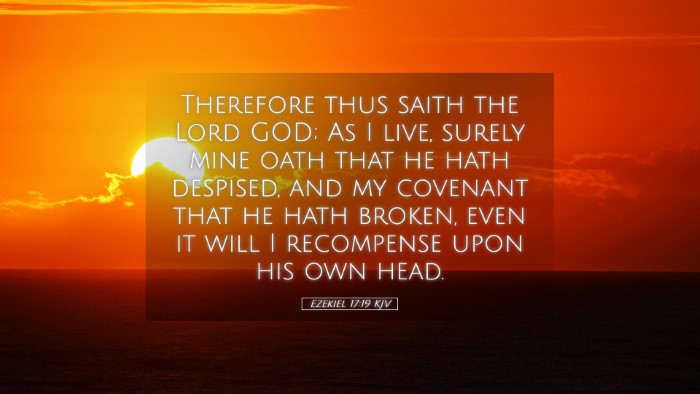Commentary on Ezekiel 17:19
Ezekiel 17:19 states: "Therefore thus saith the Lord God; As I live, surely mine oath that he hath despised, and my covenant that he hath broken, even it will I recompense upon his own head." This verse encapsulates key themes of divine judgment and faithfulness to covenant, which are deeply woven throughout the prophetic literature.
Historical Context
In order to fully appreciate the weight of Ezekiel 17:19, we must understand the historical and socio-political backdrop of the time. The verse refers to a covenant broken by the king of Judah, Zedekiah, who had sworn allegiance to Babylon but later sought help from Egypt. This breach not only reflected a political failure but also a spiritual betrayal of God's covenant.
Theological Themes
- Covenantal Faithfulness: This verse emphasizes God’s commitment to His covenant, contrasting the unfaithfulness of His people. Matthew Henry notes that God's promises cannot be broken, and His integrity demands that He respond adequately to breaches of loyalty.
- Divine Judgment: As highlighted by Albert Barnes, the pronouncement of judgment (“I will recompense upon his own head”) serves as both a warning and a demonstration of God's sovereignty. It affirms that God holds individuals accountable for their actions, especially those in positions of authority.
- The Nature of God’s Oaths: Adam Clarke indicates that God's oaths and covenants are serious declarations, binding even upon Himself. The refusal to regard such commitments, as seen with Zedekiah, leads to inevitable consequences.
Interpretative Insights
This passage has implications that extend beyond its immediate context. Several layers of interpretation emerge from the commentaries:
- Spiritual Implications: The breach of covenant speaks to a larger spiritual reality where Israel’s faithlessness can resonate with any believer's relationship to God. Pastors and theologians might reflect on how personal oaths to God require sincere devotion and action.
- Application for Leadership: Leaders must be cautious about the commitments they make, influenced by the warning in this verse. Leaders in faith communities are urged to reflect on their dedication to God's commands and the consequences of leading others astray.
- Encouragement for the Faithful: Despite the judgment pronounced, the surrounding chapters (especially in Ezekiel) also contain threads of hope and restoration. Acknowledging the despair in disobedience is vital, yet Clarke points out the enduring nature of God’s mercy towards those who genuinely seek repentance.
Conclusion
Ezekiel 17:19 reminds both ancient and modern readers of the gravity of covenantal allegiance to God. Through the reflections of Matthew Henry, Albert Barnes, and Adam Clarke, we glean profound insights about faith, judgment, and the high calling of maintaining our commitments before God. This verse serves as a poignant admonition for the faithful and a resonant call to integrity in leadership.


